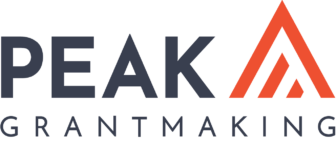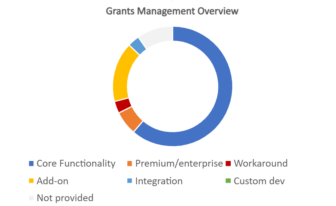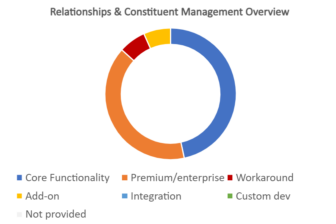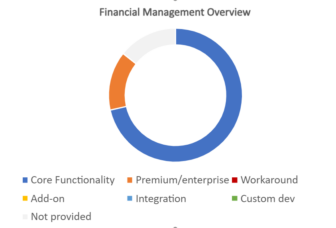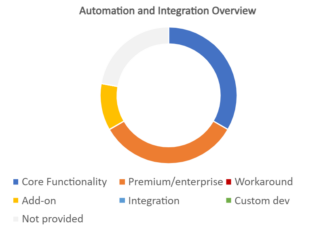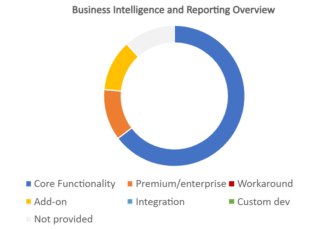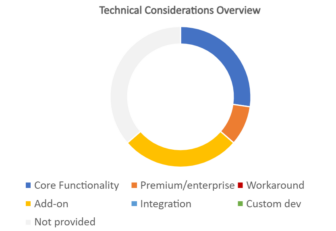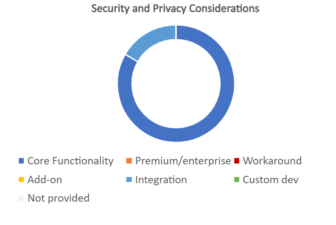GivingData is a solid, user-friendly system with a clean interface, good relationship management functionality, and several features that facilitate trust-based philanthropy. Data from the system can be surfaced in grant applications to help minimize the amount of data entry required from applicants. In addition, such features as the ability to exchange and update documents with grantees, interactions that are displayed across related records and appear along a timeline, and an exploration feature to help with budget planning combine to help foundation staff conduct relationship-centric and collaborative giving.
The system’s “Super Docs” format provides the ability to update data within the system when a document is updated, while its “Super Search” lets you create and manipulate complex searches within the system. Recent updates have strengthened external reviewer abilities and added an in-system cloud-based document management option for foundations that do not have subscriptions to tools like OneDrive or Box.
Vendor: GivingData, LLC
Year Released: 2016
Pricing
Yearly subscription pricing for the system is broken into three tiers: Go, Pro, and Enterprise. The Go level provides a full set of tools for simple grants management. Pro subscriptions add on features such as workflows, branching logic, scenario planning, and multi-currency support. Enterprise subscriptions are for clients with more advanced requirements or that need custom integrations. While the vendor did not provide specific sample pricing, it did note that yearly subscription costs range from $9,000 to more than $50,000.
GivingData offers three implementation packages depending on the complexity of the implementation and data and/or document migration. Costs range from $6,600 to more than $25,000. The vendor has also developed a partnership program with several technology consultants who can assist clients with implementations and strategic services.
Estimated Yearly Costs:
- Small Foundation (< $25 million in grants, 1-5 staff): $9,000-$25,000+
- Mid-Size Foundation ($25-500 million in grants, 10-25 staff): $20,000-$50,000+
- Large Foundation (> $500 million in grants, 50+ staff): $50,000+
Grants Management
The system provides solid grants management and tracking capability throughout the grant lifecycle, from application through progress reporting and close-out. It now has a republishing function for progress reporting that allows the foundation and grantee to exchange and update the same document over time, with the ability to enable version control on each upload.
There is a grantee portal, which is a separate database where applicants can complete online applications and can track their application status, requirement due dates, payment status. Grantees also upload progress reports to the portal. It is possible for new applicants to the foundation to create an account in the portal, but this functionality is an add-on at an extra cost for subscribers at the Go level.
The portal is a SQL database that talks to the foundation’s master GivingData SQL database, so it has ability to display and use data from the master database in applications. That means that organizations that already have records in the system can prefill their applications with existing data. For each application, you can determine how the system handles changes to system data when the application is imported into the master GivingData database: prompt to review the change, overwrite the system data, don’t overwrite the system data, or import all content where fields are empty. You can also allow returning applicants to see answers they provided previously for application fields mapped to the database, and let them reuse those answers for new applications.
Applications can be invitation-only or open to all. You can add images to applications and use rich text formatting on questions. They can also contain a variety of question types. Pro and Enterprise package subscribers can include questions with branching logic. The vendor has a Demographics via Candid integration that allows you to auto-populate demographic information from an organization’s Candid profile into an application; if the applicant wants to update or change any of the information, a link in the application will send them to Candid to make those changes, which are then reflected back in the application.
You can specify the types of file attachments that applicants can upload to the system. There is a 20MB size limit per file, but the vendor reports that it has increased that limit for several clients for an additional fee. There are no overall storage limits for the foundation. The vendor has also released a budget template tool that allows you to collect budget line items that can be imported directly into database fields; the tool does not automatically calculate subtotals or totals.
The vendor has also created two types of general intake forms that can live on the grantee portal. One can be associated with a particular grant and allows a grantee to submit an amendment request, and one allows a grantee to update their organization information.
An external reviewer module is available as an add-on at an extra cost. External review assignments and reviews are done using the grantee portal database. When reviewers log in, they will see a list of the reviews assigned to them. The vendor recently released an update to the portal that allows reviewers to see the application and review form side-by-side. You can solicit a variety of types of reviews, from numerical scoring and ranking evaluations to comments, and see all the reviews in the portal once they are completed. The vendor reports that it is adding the ability to define multiple rating scales with weighted scores and simplify the assignment of reviewers based on a reviewer’s area of expertise.
Relationships and Constituent Management
GivingData includes a variety of CRM capabilities that confer benefits both to the foundation and to grantees. The system has both individual contact and organization records, with the ability to specify relationships between records. Individuals can be associated with more than one organization, which allows grant writers to use one set of login credentials to work on several different organizations, and also allows the foundation to track board members and other individuals affiliated with multiple nonprofits.
Organization profiles can be verified against government nonprofit/charity databases in the U.S., England, Wales, and Australia. They can include charts and tables of demographic information from the vendor’s free Demographics via Candid integration, and foundations can also add information on the demographics of populations served by the nonprofit via custom fields.
Interactions are stored as separate objects in the database, and can be linked to individual contact records, organization records, and grant records. They display as icons along a timeline within each record as well as in tabular format below the timeline. Customers with Pro and Enterprise subscriptions can take advantage of integrations with Outlook and Gmail to easily capture messages sent outside the system into contact, organization, and grant records. These interaction records will also include any attachments, and any replies to the message thread will automatically be recorded in GivingData as well.
The system supports both email and letter templates. Letter templates are available to all clients, as are automated emails, such as reminder emails. Pro and Enterprise subscribers also have the ability to create templates for other types of emails and can view open and clickthrough data for bulk emails sent through the system. Letter templates can include fields that display content held in the database, and files saved in the system’s “Super Docs” format let you insert merge fields in a document that will update in the system when changes are made in the document.
GivingData provides several options for document management. You can integrate with OneDrive, Google Drive, and Box; these integrations can coexist if you have accounts with more than one cloud storage account. The vendor also recently released a native document management solution called GD Cloud that leverages the storage in SQL. You can open documents stored in GD Cloud in your browser, edit them with collaborative editing functionality, and save the new version, all without having to download or upload any files.
The vendor reports that board portal functionality is possible through an add-on to the system that is available at an extra cost.
Financial Management
The system allows you to track grant payments. There is no ability to set up default payment schedules for grants; they are set up individually when a grant is approved. Payments can be made contingent on the completion of specified requirements.
You can set up program budgets and track drawdowns when grants are paid. A view by code allocation allows foundations to track things both by total dollar amounts and by percentage allocation of the budget in a specific area. The scenario planning tool by default shows two years of budgets, but can be adjusted to show budgets for as many fiscal years as are configured in the system. This flexibility aids in planning multi-year grants. You can also see upcoming renewals when you are in planning mode—the system surfaces grants that are within the notification window, and you can easily click on them to create a renewal record and add it to your pipeline.
The vendor recently released an exploration feature to help foundations build out ideas without impacting the budget. Ideas with an exploring status appear at the top of the budget planning tool as they are being built out, and then can be moved directly into the budget when they are ready to move forward.
The system does not include any accounting integration, but the vendor reports it will be releasing an integration with BILL later this year in conjunction with open financial data APIs that can be used by clients to develop integrations with multiple accounting systems.
Automation and Integration
The system allows you to create different types of workflows that align with your foundation’s processes, and has different types of automations based on the type of workflow. Pro and Enterprise subscribers have the ability to create multiple custom workflows. The vendor reports that it is developing a workflow enhancement that would allow you to add workflows based on a variety of triggers. Automated emails can be set up for application submissions, renewal reminders, report due dates, and more.
There are 10 pre-built integrations in the system, including Gmail and Outlook, Demographics via Candid, OneDrive, Box, DocuSign, Adobe Sign, Eligibility Verification for UK-Registered Charities in England and Wales, Australian Business Register ACNC, and OFAC.
GivingData offers both public and private APIs for Pro and Enterprise subscribers. This includes its CRM APIs and its web publishing APIs. Later this year, the vendor reports that it will be releasing open financial data APIs to allow clients to develop integrations with accounting systems. Documentation for the APIs can be found in the vendor’s knowledgebase. As mentioned earlier, the vendor also reports that it is working on an integration with BILL that will be released in late 2024.
Business Intelligence and Reporting
The navigation across the top of the system provides access to a quick keyword search of organization, grant, and contact records. There is also a “Super Search” that provides more advanced functionality, including the ability to edit and reorder columns and column labels, to group fields, and to save the search as public or private. Users are able to do batch operations from Super Search results and export search results to Excel. There is also now the ability to view Super Search results in a list view or as a line graph or bar chart to show comparisons or trends. These charts can be exported as an image or you can export the underlying data in Excel or CSV format.
The home page that is displayed when you log in to GivingData is configurable. The system comes with four widgets that display task assignments, recently viewed records, and recently run reports. In addition to the home page widgets, users can build out custom dashboards in each area of the system, including for application intake, payments, approvals, and grant reports/requirements. Dashboards can be private or public—you can click through charts in the dashboards to see the underlying records, but this feature is not available for charts created in the search module.
The system comes with nine pre-built reports. Out-of-the-box reports are configurable by the user, who can save the customized report. Pro and Enterprise subscribers can also create ad hoc reports that can be exported to Excel and in PDF format. You can categorize and favorite your reports and Pro and Enterprise subscribers have the ability to schedule reports to run at certain times or intervals. Outcomes reporting is possible with an additional module that is available at an extra cost.
Technical Considerations
The system is designed responsively for display across a variety of devices. The vendor reports that it is working toward WCAG 2.1 compliance and has a report from a third-party with a full set of recommendations for increasing accessibility for users of the system. Clients are able to upload their own taxonomies to use in the system; it does not come with a pre-existing taxonomy.
Multi-currency support is available to Pro and Enterprise subscribers. The vendor reports that all content in the system can be multilingual, but there are not any online translation add-ons available. For an additional fee, GivingData offers dedicated services for bulk data import. The cost varies based on the project’s scope.
The vendor is currently exploring ways to integrate AI tools into existing functionality and has developed a prototype that uses AI to summarize interactions in the system and perform sentiment analysis on interactions; it has not as of yet been released to customers.
Security and Privacy
GivingData’s Trust Center provides information about security policies, privacy policies, and compliance Standards. The vendor also provides SLA and disaster recovery policies to potential clients who sign a nondisclosure agreement.
Login security can be protected by multifactor authentication and/or single sign-on via integrations with Okta, OneLogin, Microsoft, and Google. System administrators have a granular ability to grant or restrict user access to a wide variety of system functions. An audit log provides a record of all changes made in the system. System data is encrypted both at rest and in transit.
Training and Support
|
|
Included | Additional Cost |
Not available |
|
Phone |
X |
||
|
Chat |
X |
||
|
|
X |
||
|
Knowledgebase |
X |
|
|
|
Training Videos |
X |
|
|
|
User Community |
X |
|
|
|
Implementation |
X |
There are three branches in GivingData’s customer support team: implementation consultants, client success managers, and the helpdesk. The implementation consultants hand clients off to a dedicated client success manager (CSM) once the system is up and running. After implementation, clients meets monthly with their CSM for a three-month period and then transition to quarterly meetings. All support requests to the helpdesk are made via a ticket submission tool that is integrated in the platform.
A knowledgebase is integrated with GivingData’s online user community and includes training videos updated on a regular basis.
Customer Experience Survey
Number of Survey Respondents Using the System: 37
Percent Who Would Recommend the System: 97.3
Training Rating: 3.51/4
Implementation Rating: 3.53/4
Support Score: 3.46/4

